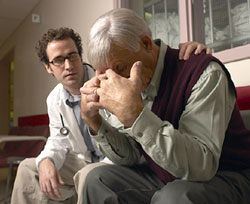When thinking about the well-being of older adults, most people focus on medical care, but mental health care is a growing, pressing concern for older adults and their families. “At least one in five older adults suffer from a mental disorder and experts in geriatric mental health anticipate an ‘unprecedented explosion’ of older adults with disabling mental disorder,” says Enola K. Proctor, Ph.D., a mental health care expert and professor of social work at Washington University in St. Louis.
“While older adults may receive adequate medical and psychiatric care, they rarely receive the care necessary to deal with the general ‘problems with living,’ or social stresses. These psychosocial problems, such as isolation and family stress, may exacerbate psychiatric problems, depression in particular, and contribute to functional decline.”

Just as the quality of medical care has become a major national concern, the quality of mental health care has become a primary focus of the Institute of Medicine and other national policy groups. In a new study published in the current issue of The Journal of Behavioral Health Services & Research (Vol. 33), Proctor and colleagues examined the quality of follow-up care for 186 patients discharged from the geropsychiatric unit of a large urban hospital after treatment for depression.
The study, “Quality of Care for Depressed Elders in Post-Acute Care: Variations in Needs Met Through Services,” assessed the quality of psychiatric, medical, functional and psychosocial care. Psychosocial care includes socialization, counseling and casework services for dealing with family, housing, financial and social problems. The study results show:
• Almost three fourths of the patients had their needs for follow-up psychiatric care met.
• Eighty percent of the patients received the necessary electroconvulsive therapy and psychotropic medication monitoring and supervision for cognitive impairment.
• Nearly all patients reported receiving services to meet their needs for functional dependency, including help with meals, toileting and ambulation.
• Urban elders received better psychiatric care than did rural elders.
• Elders in worse physical health received poorer psychiatric care.
• Follow-up care for psychosocial problems was poorest; about one third of patients needing such care received no services in this area by six weeks postdischarge.
“Psychosocial problems or social stresses may be perceived by elders, family members and providers as less pressing than their functional abilities or their psychiatric and medical illnesses,” Proctor says. “Psychosocial services are unlikely to be widely known or well understood by older adults, may be stigmatized, and are less often covered by insurance.”
Findings of this study show that the health and mental health professionals who serve older adults should be more attentive to their psychosocial needs.
“Older adults who experience social, economic and family problems should be linked with social service agencies that are equipped to meet their psychosocial needs,” she says.
The study also indicates that while service providers addressed most psychiatric needs, older adults with more medical illness received poorer psychiatric care, suggesting that medical illness may overshadow — for providers, patients and families alike — elders’ mental health needs.
“While medical needs cannot be ignored, physicians and other health providers who work with older adults should address the needs of the older adult as a whole person,” Proctor says. “Meeting an individual’s psychiatric and psychosocial conditions can contribute to well-being and recovery, and the professionals who work with older adults should be trained to assess and respond to these needs.”
Study co-authors are: Nancy Morrow-Howell, Ph.D., professor of social work at Washington University; Mi Jin Lee, M.S.W., graduate social work student at Washington University; Jessica Gledhill, M.S.W., staff member at Family and Children Services in Tulsa, Okla.; and Wayne Blinne, M.A., staff member at Center for Mental Health Services at Washington University.